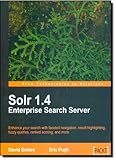Eric Pugh
Co-author of "Solr 1.4 Enterprise Search Server"
Fascinated by the “craft” of software development, Eric Pugh has been heavily involved in the open source world as a developer, committer, and user for the past 5 years. He is an emeritus member of the Apache Software Foundation and lately has been mulling over how we move from the read/write web to the read/write/share web.
In biotech, financial services and defense IT, he has helped European and American companies develop coherent strategies for embracing open source software. As a speaker he has advocated the advantages of Agile practices in software development.
Eric became involved in Solr when he submitted the patch SOLR-284 for Parsing Rich Document types such as PDF and MS Office formats that became the single most popular patch as measured by votes! The patch was subsequently cleaned up and enhanced by three other individuals, demonstrating the power of the Free/Open Source Model to build great code collaboratively. SOLR-284 was eventually refactored into Solr Cell as part of Solr version 1.4.
Eric co-authored “Solr 1.4 Enterprise Search Server”, the first book on Solr.
He blogs at http://www.opensourceconnections.com/blog/.
Presentations
So you're building a website and want a terrific search experience for your users. Do what your database can't: faceted navigation, result highlighting, fuzzy queries, ranked scoring, spell correction, and more.
Solr, the open-source enterprise search server is the answer. Solr bridges the technology divide between databases and document/web search engines (e.g. Google). Each has its uses but do not overlap.
Chances are you have some structured data, probably in a database, and perhaps some related text documents. When you bring this data into Solr, you'll be able to deliver amazing features. Users will be able to navigate search results by filtering on aggregated attributes (so- called “faceted search”). Furthermore, various features like spell- correcting, auto-completing of search text, boosting records based on various rules, become possible. Solr does not tie you to a particular programming language or computing platform. And whether you have a thousand records or millions and many requests per second, Solr can scale to meet your performance needs. Furthermore, as an open-source solution, Solr doesn't ask you for more money when you want more out of it.
You'll lean the basics of getting started with Solr, and an understanding of what solutions are available to simplifying adding great search to your site!
TBA
So you've decided that you need great search, and Solr is going to be the solution? Well implementing a successful search solution based on Solr is a lot more then just downloading some code and firing it up, although Solr does pass the 15 minute test with flying colors!
In this case study we'll look at the various pitfalls and challenges involved in migrating a content driven site from Lucene to Solr for the nations fourth largest retailer. We'll look at some of the decisions we made, from technical, to networking, to operational, and how they impacted the final solution.
You'll leave this session know what challenges await a successful migration effort, and what questions to ask to make sure you are successful.
TBA2
Books
Solr 1.4 Enterprise Search Server
by David Smiley and Eric Pugh
- The book takes a tutorial approach with fully working examples. It will show you how to implement a Solr-based search engine on your intranet or web site. This book is for developers who would like to use Solr for their applications. You only need to have basic programming skills to use Solr. Knowledge of Lucene is certainly a bonus.

